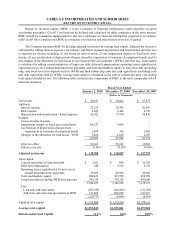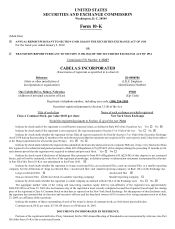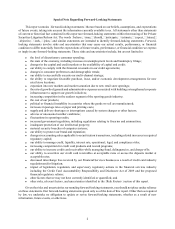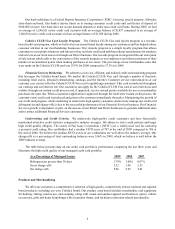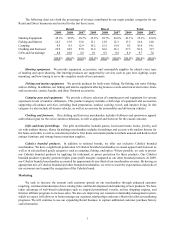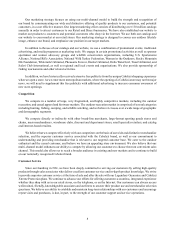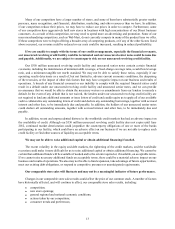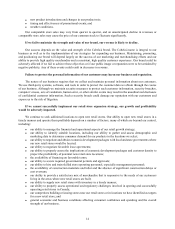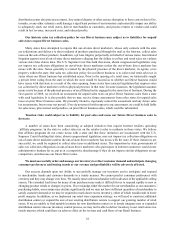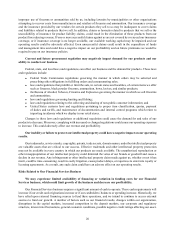Cabela's 2009 Annual Report Download - page 19
Download and view the complete annual report
Please find page 19 of the 2009 Cabela's annual report below. You can navigate through the pages in the report by either clicking on the pages listed below, or by using the keyword search tool below to find specific information within the annual report.10
There are various federal and Nebraska laws and regulations relating to minimum regulatory capital
requirements and requirements concerning the payment of dividends from net profits or surplus, restrictions
governing transactions between an insured depository institution and its affiliates, and general federal and
Nebraska regulatory oversight to prevent unsafe or unsound practices. At the end of 2009, our bank subsidiary
met the requirements for a “well capitalized” institution, the highest of the Federal Deposit Insurance Corporation
Improvement Act’s five capital ratio levels. A “well capitalized” classification should not necessarily be viewed as
describing the condition or future prospects of a depository institution, including our bank subsidiary.
At the beginning of fiscal 2010, our bank subsidiary’s required capital will be increased under regulatory capital
requirements of the applicable federal agencies as a result of new accounting standards requiring the consolidation
of the assets and liabilities of the Cabela’s Master Credit Card Trust and related entities (collectively referred to as
the “Trust”) on our bank subsidiary’s balance sheet. As of December 31, 2009, the most recent notification from the
FDIC categorized our bank subsidiary as well capitalized under the regulatory framework for prompt corrective
action. In order for our bank subsidiary to continue to meet the minimum requirements for the well-capitalized
classification under the regulatory framework for prompt corrective action, we will contribute approximately $200
million in 2010 in additional capital to our bank subsidiary. See “Risk Factors – Recently adopted amendments to
accounting standards will require us to consolidate previous and future securitization transactions, which will have
a significant impact on our consolidated financial statements, and will cause us to reallocate capital from our Retail
and Direct businesses to meet the capital needs of our Financial Services business” and “Management’s Discussion
and Analysis of Financial Condition and Results of Operations – Impact of New Accounting Pronouncements.”
The activities of our bank subsidiary as a consumer lender also are subject to regulation under the various
federal and state laws. We spend significant amounts of time ensuring we are in compliance with these laws and
work with our service providers to ensure that actions they take in connection with services they perform for us
are also in compliance with these laws. Depending on the underlying issue and applicable law, regulators are often
authorized to impose penalties for violations of these statutes and, in some cases, to order our bank subsidiary to
compensate injured borrowers. Borrowers may also have a private right of action to bring actions for some violations.
Federal bankruptcy and state debtor relief and collection laws also affect the ability of our bank subsidiary to collect
outstanding balances owed by borrowers.
The Credit Card Accountability Responsibility and Disclosure Act of 2009 (the “CARD Act”) was signed into
law in May 2009. The CARD Act restricts our ability to increase interest rates on existing credit card balances, charge
over-limit fees, and charge fees for making a payment. The CARD Act provisions also further define acceptable
due dates, payment allocations, disclosure requirements, and “reasonable” fees and prohibit increasing the interest
rates on variable rate credit card accounts that are subject to a fixed-rate floor. Certain provisions of the CARD Act
became effective on August 20, 2009. Other provisions become effective in February 2010 and August 2010. See
“Risk Factors - The Credit Card Accountability Responsibility and Disclosure Act of 2009 and related regulations
may impact the practices of our Financial Services business and could have a material adverse effect on our results
of operations” and “Management’s Discussion and Analysis of Financial Condition and Results of Operations –
Developments in Legislation and Regulation.”
On June 17, 2009, the Obama administration announced a sweeping proposal to reform the U.S. financial
services industry. One of the changes included in this proposal was to eliminate the exemption from the definition of
“bank” under the BHCA for credit card banks, such as our bank subsidiary. On December 11, 2009, the U.S. House of
Representatives passed “The Wall Street Reform and Consumer Protection Act of 2009” (the “House Reform Bill”).
Under the House Reform Bill, the exemption from the definition of “bank” under the BHCA for credit card banks
was preserved. It is unclear whether any enacted legislation will preserve, eliminate, or modify this exemption. If
such exemption were eliminated or modified, we may be required to divest our ownership of our Financial Services
business unless we were willing and able to become a bank holding company under the BHCA. See “Risk Factors -
Proposed financial system reforms could, if adopted as proposed, require us to divest our Financial Services business,
which may materially adversely affect our business and results of operation” and “Management’s Discussion and
Analysis of Financial Condition and Results of Operations – Developments in Legislation and Regulation”.


